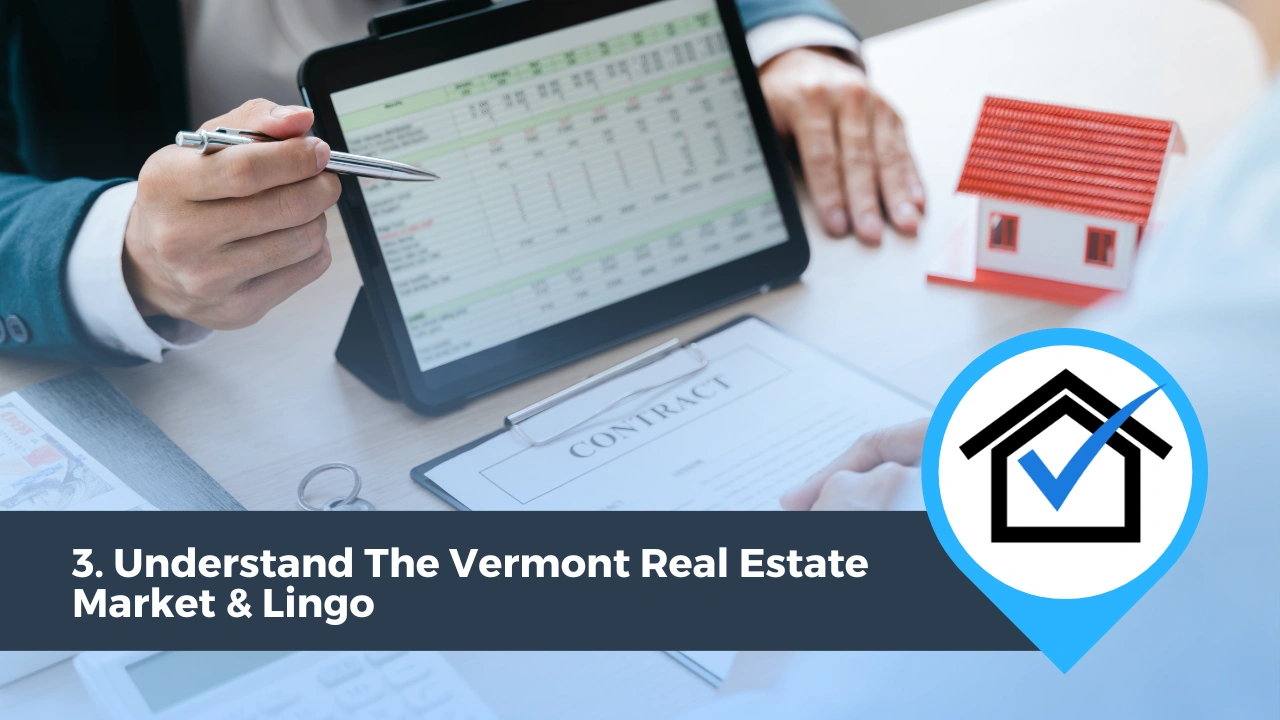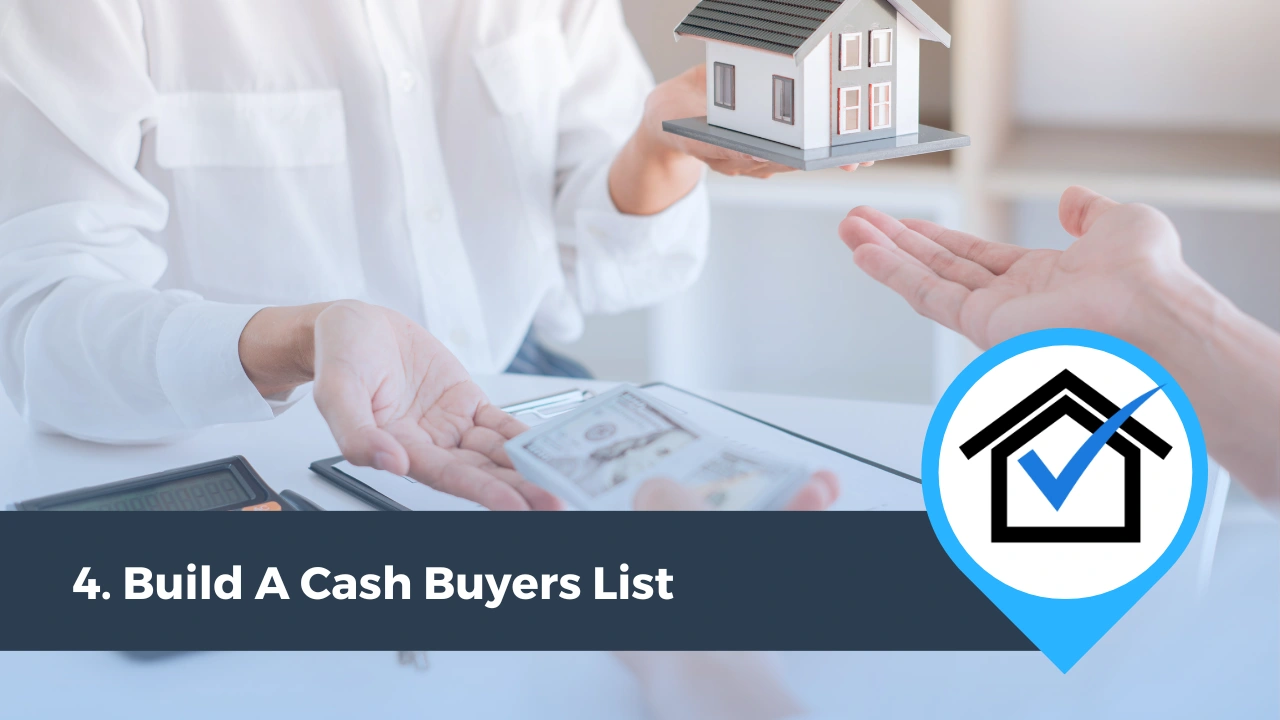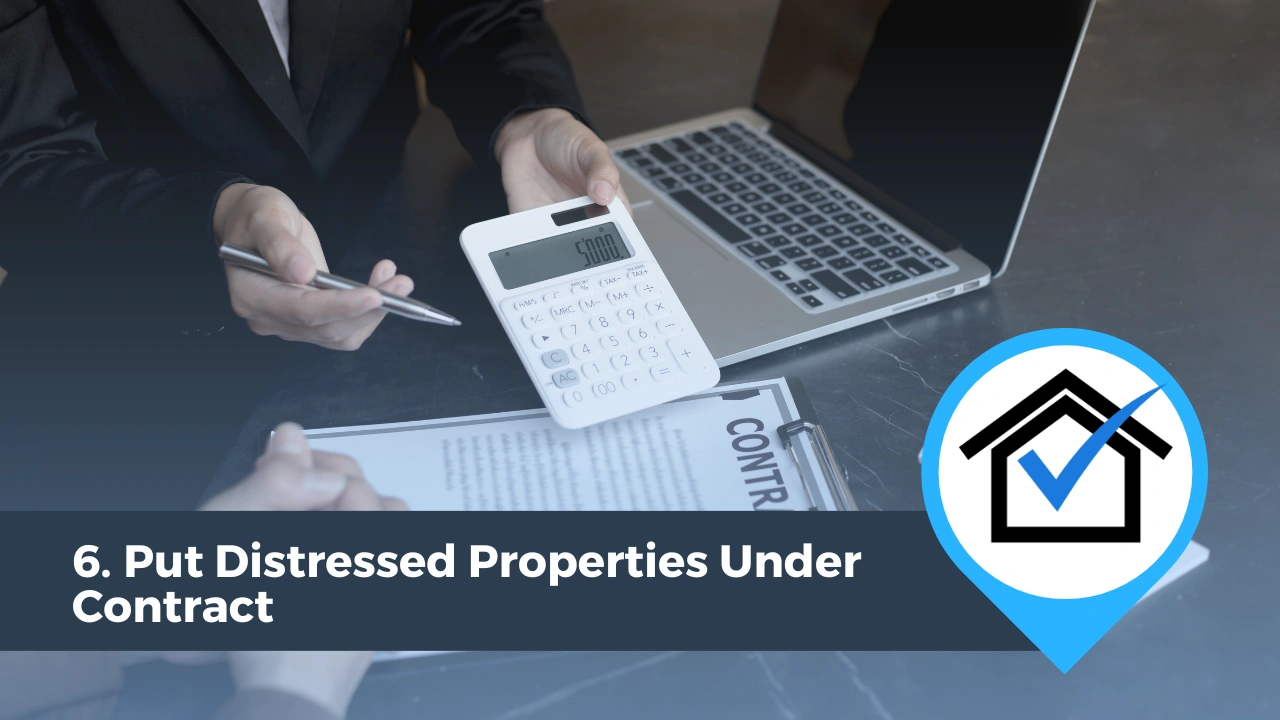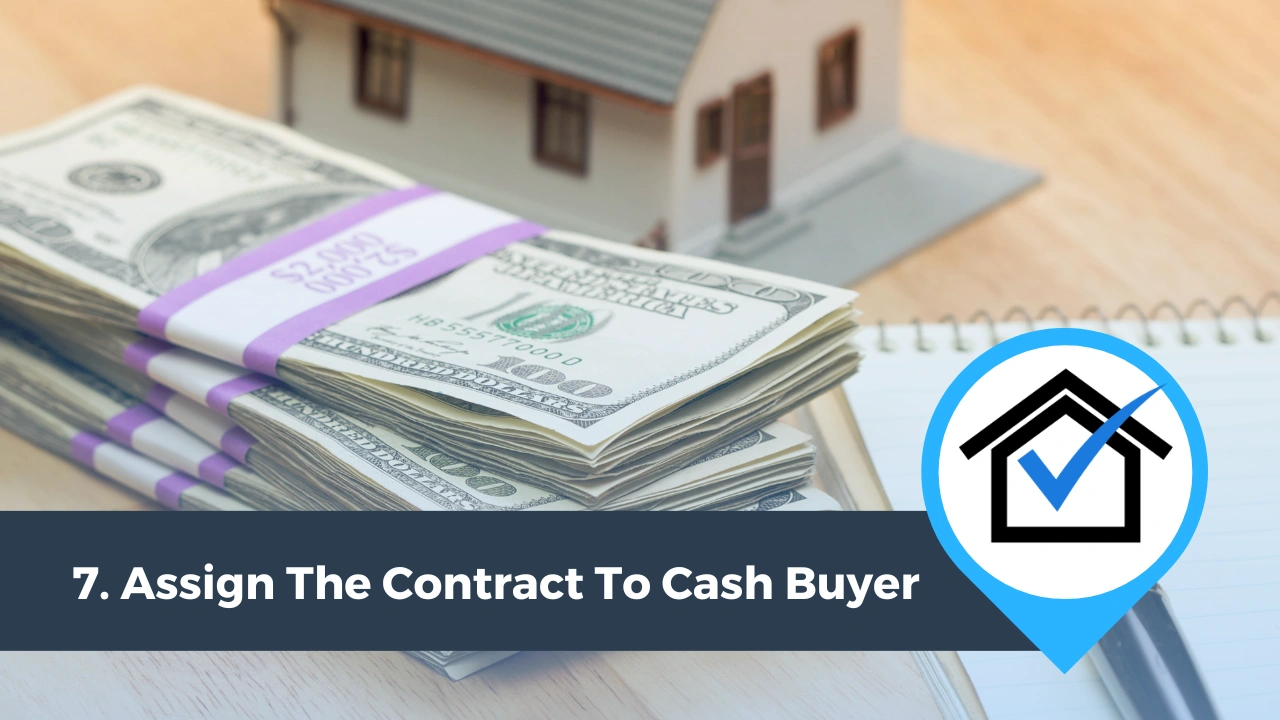
How To Wholesale Real Estate In Vermont: Step By Step (2025)
Feb 22, 2025
Wholesaling is a popular real estate investing technique that allows almost anyone to make money in the business, regardless of their professional background or credit score. With a population of 646,972 people in the state of Vermont and over 336,000 housing units, there is plenty of opportunity for real estate wholesaling in Green Mountain State.
However, to be successful, you must understand the basics and do some research before diving in. This is the complete guide on how to wholesale real estate in Vermont.
- What Is Wholesaling Real Estate?
- How To Wholesale Real Estate In Vermont (9 Steps)
- Is Wholesaling Real Estate Legal In Vermont?
- How Much Do Real Estate Wholesalers Make In Vermont?
- Do You Need A License To Wholesale Real Estate In Vermont?
- Is Wholesaling In Vermont Easy?
- Final Thoughts On Wholesaling In Vermont
Ready to Take the Next Step in Real Estate Investing? Join our FREE live webinar and discover the proven strategies to build lasting wealth through real estate.
Whether you're just getting started or ready to scale, we'll show you how to take action today. Don't miss this opportunity to learn the insider tips and tools that have helped thousands of investors succeed! Seats are limited—Reserve Your Spot Now!
What Is Wholesaling Real Estate?
Wholesaling real estate is a technique that involves finding distressed properties and selling them to other investors at a markup. Your job is to go out and look for wholesale properties that can be purchased at a significant discount. To find them, you will look for motivated sellers or homeowners looking to move quickly because they are in foreclosure or facing another serious life event.
You will agree to purchase the home from them so they can avoid damaging their credit or risking other financial consequences and have them sign a contract agreeing to a certain price. This process is a prime example of how to start investing in real estate with no money, as it allows you to leverage contracts rather than capital. Once you have the property under contract, you market the deal to another investor who is usually a house flipper.
If you crunch the numbers correctly, you can charge the end buyer a markup and collect the difference between that amount and the original purchase price as a wholesale fee. While this process takes patience and practice to master, it allows virtually anyone to become a real estate investor without ever having to purchase a home for themselves.
Read Also: Virtual Real Estate Investing: The (Ultimate) Guide
How To Wholesale Real Estate In Vermont (9 Steps)
Dive in as we take a look into how to wholesale real estate in Vermont in 9 simple steps. Be sure to check out our in depth video showing you how to wholesale real estate step by step here:
With that in mind, here's our simple step by step process for wholesaling real estate in Vermont:
- Partner With A Wholesale Mentor
- Learn Vermont Real Estate Wholesaling Laws & Contracts
- Understand The Vermont Real Estate Market & Lingo
- Build A Cash Buyers List
- Find Motivated Sellers & Distressed Properties
- Put Distressed Properties Under Contract
- Assign The Contract To Cash Buyer
- Close Deal And Collect Assignment Fee
- Double Close Or Wholetail When Necessary
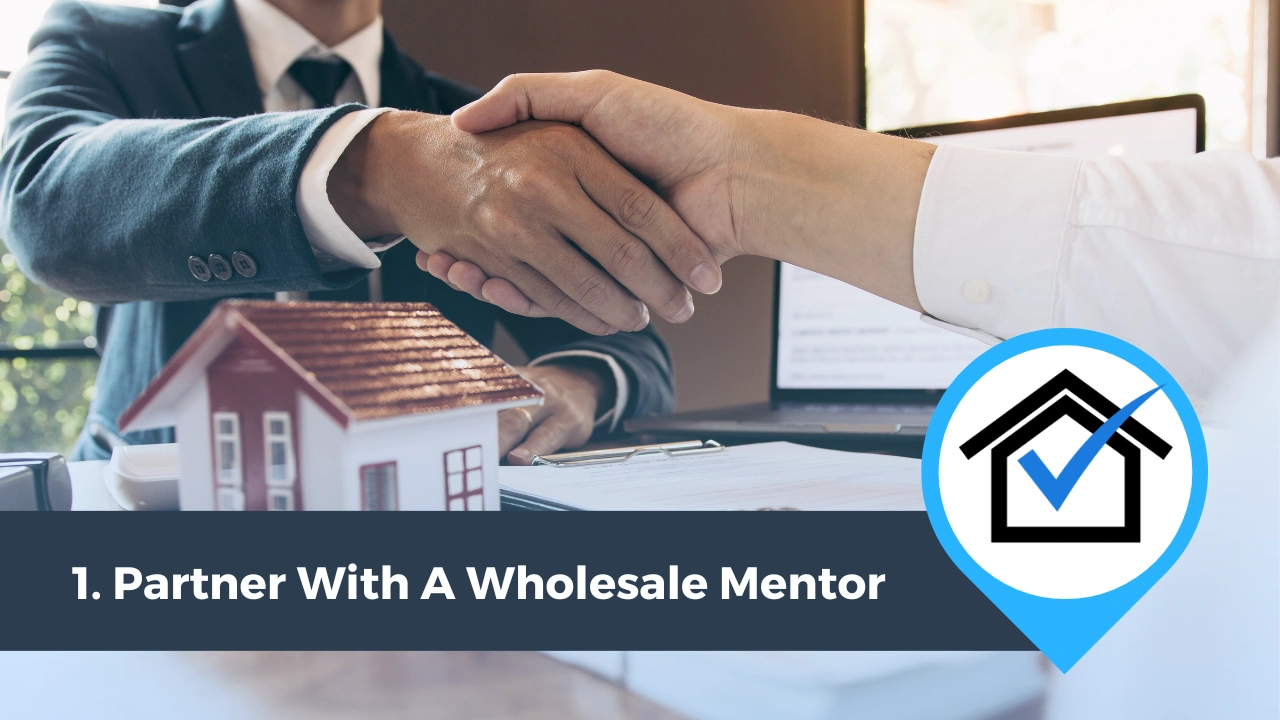
1. Partner With A Wholesale Mentor
While wholesaling houses isn't all that complex once you break down the core concepts, creating a system that consistently brings in leads and produces lasting results takes some trial and error. One way to expedite this process is to find a wholesale mentor. A mentor will help guide you through the process and show you the ropes so you can avoid any costly mistakes.
They can also introduce you to people in their network who may be helpful in your business and can share the systems and tools they use to locate homes and process real estate deals. So, if you can find a mentor you work well with, you should seriously consider it.
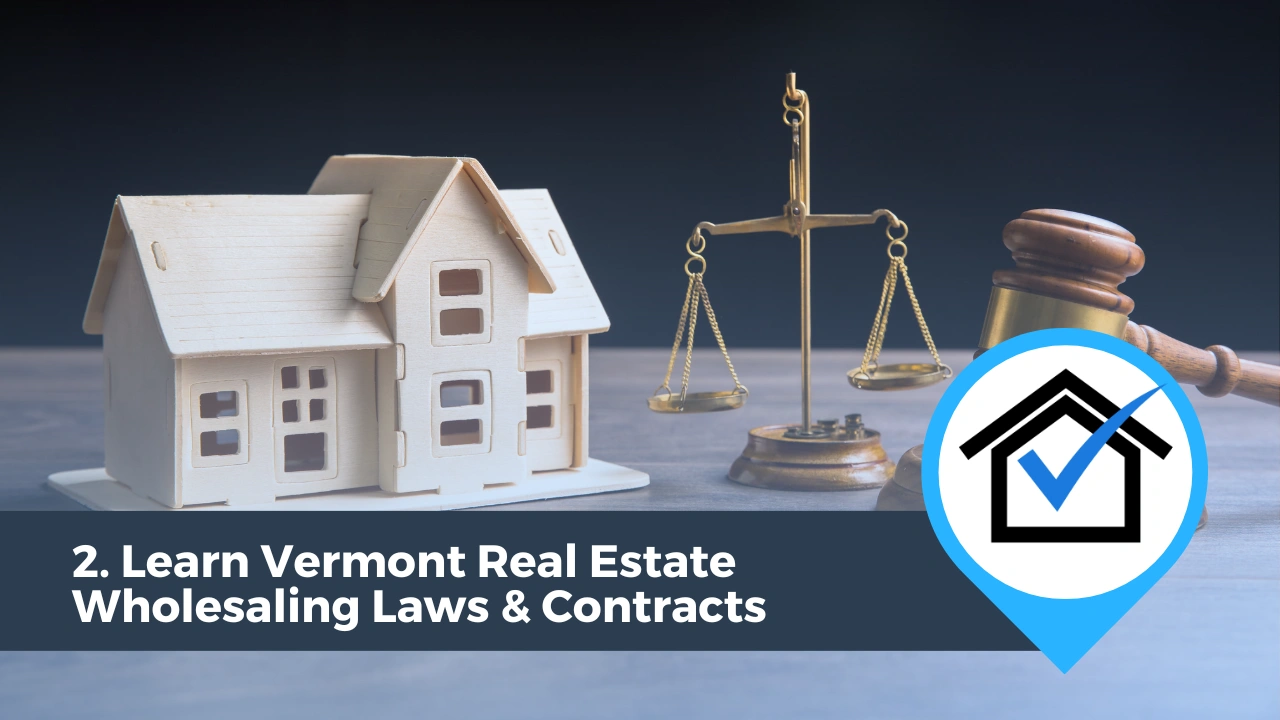
2. Learn Vermont Real Estate Wholesaling Laws & Contracts
Next, you'll want to familiarize yourself with the local wholesaling laws and real estate contracts. Although wholesaling is perfectly legal in Vermont, every state has unique laws regarding the practice and what is prohibited. For instance, Vermont is an attorney-close state, meaning all real estate transactions must be handled by a real estate attorney licensed by the Vermont Bar Association.
It's also crucial to avoid engaging in any behavior that requires a real estate license if you are not a broker. You can find the laws regarding real estate practices in Vermont in Title 26, Chapter 41 – Real Estate Brokers and Salespersons of the Vermont Statutes.
It's also wise to familiarize yourself with the types of contracts you'll use in your practice as a wholesaler. Without a proper contract, you can easily be cut out of a deal, even after you put in all the hard work. So make sure to have all the paperwork ready and consult an attorney if you aren't sure what to use.
The main contract you should know is the purchase agreement, aka the bilateral contract. This is the legally binding document that commits a buyer and seller to a sale. Purchase agreements typically feature a clause that allows you to assign your interest to another party, which is how you will close your wholesale deal.
3. Understand The Vermont Real Estate Market & Lingo
Once you have a solid understanding of the local laws in Vermont, you should also study the local real estate market and lingo. As a wholesaler, having a solid understanding of the real estate market and different price points is crucial to your success. The amount of money you make largely depends on your ability to understand the value and find the sweet spot between the price a seller is willing to accept and what the buyer is willing to spend.
The best way to do that is to study the local market and understand the ins and outs. So, study local housing prices, demographic trends, zoning laws, school zones, crime rates, transportation stats, and anything else that may impact the market.
Also, if you want to master the lingo and learn more about real estate, it often helps to attend local real estate investor meetings and conferences. The National Association of Realtors (NAR) is an excellent place to start and often has networking events and other activities for real estate professionals, including wholesalers.
Here are a few active NAR chapters in Vermont.
- The Vermont Association of Realtors
- The Northwest Vermont Board of Realtors
- The Lamoille Area Board of Realtors
- The Addison County Board of Realtors
- The South Central Vermont Board of Realtors
You can also find more information and resources through the Vermont Real Estate Commission, the board appointed by the governor to oversee the practice of real estate in Vermont.
Read Also: How To Wholesale With A Realtor: The (ULTIMATE) Guide
4. Build A Cash Buyers List
After familiarizing yourself with the proper terms and concepts, you're ready to build a cash buyers list. One of the hardest parts of wholesaling is finding a suitable buyer once you've got the property under contract. The sellers you'll be dealing with will want to move quickly, so you won't always have time to start looking for buyers once the property is under contract.
The way to get around this is to build a cash buyers list before you begin looking for properties. This will be a list of investors who are actively flipping houses or looking for a discounted rental property who may be interested in your deal.
You can find cash buyers by attending local real estate events and conventions, looking on social media, posting ads on Craigslist and Facebook, calling the number on any "We Buy Houses" signs, or asking real estate agents for recommendations.
When you talk to any potential cash buyers, make sure to get the following information:
- Contact Information
- Budget
- What type of housing do they buy?
- What markets do they work in?
- How soon are they looking to buy?
- How do they finance deals?
You can also check out this video on how to find cash buyers!
Collect all this information and keep it neat and organized in a spreadsheet or CRM software. It's also important to note that you don't only have to look in Vermont.
Investors in New York, New Hampshire, Rhode Island, Maine, or Connecticut could also be looking for an investment property in Vermont.
The more names you take down and the more organized you keep the info, the easier it will be to find a buyer when the time comes.
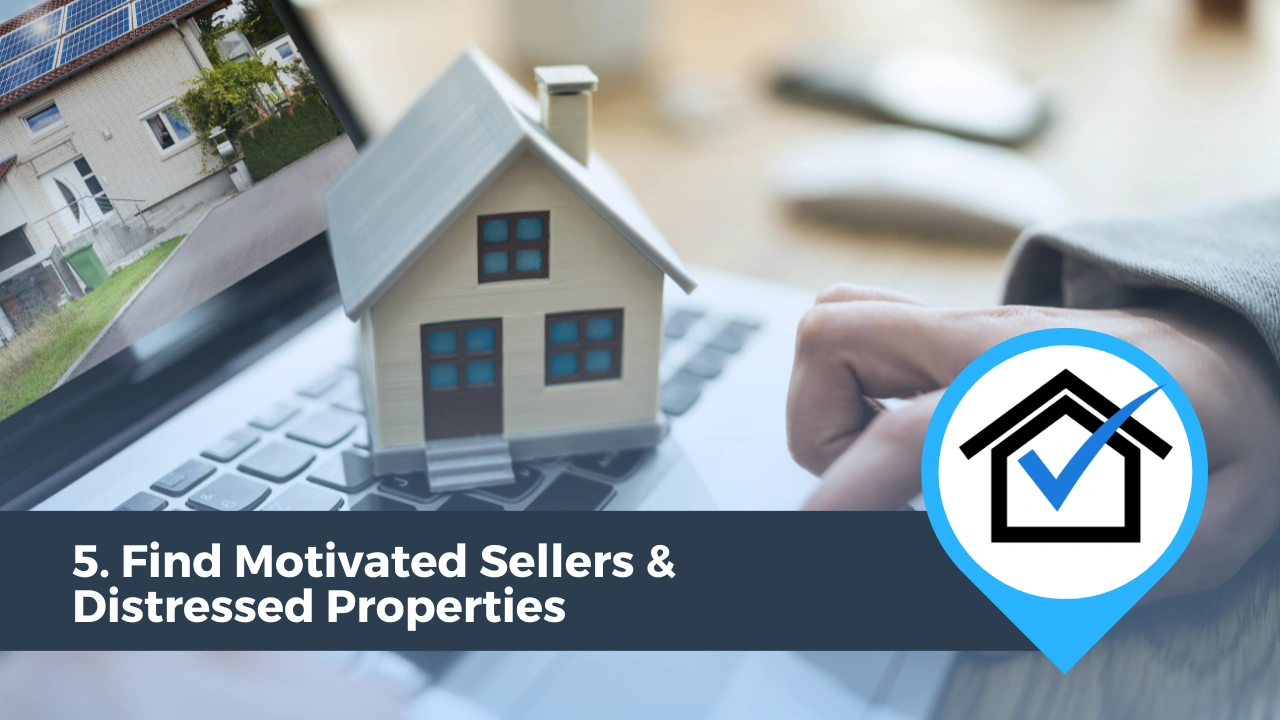
5. Find Motivated Sellers & Distressed Properties
Once you have a solid cash buyers list, it's time to hit the ground running and start looking for motivated sellers and distressed properties. A distressed property is either in foreclosure or the homeowner is having trouble keeping up with the payments to their lender because they are behind on the mortgage, taxes, or deferred maintenance.
As a result, the homeowner will be highly motivated to sell because they don't have time to list it for market value and may be worried about destroying their credit. As a result, they'll often be willing to let go of the home at a discounted price in exchange for a fast close.
You can find motivated sellers in several different ways, including:
- Posting bandit signs
- Property auctions
- Checking public records for foreclosure, bankruptcies, tax liens, etc.
- Direct mailers
- Driving for dollars
- Checking the MLS
You'll have to find a strategy that works for you, but there are many different techniques and resources you may consider. You likely won't get a response on the first try, but if you're persistent with your marketing, you'll eventually find someone willing to entertain your offer.
Read Also: Finding Motivated Seller Leads: Free & Paid Tactics
6. Put Distressed Properties Under Contract
But getting a response is only half the battle. Once you hear back from a seller, the next step is determining the price and getting the property under contract. You should familiarize yourself with two key formulas if you want to make a reasonable offer; after-repair value (ARV) and maximum allowable offer (MAO).
After Repair Value
The after-repair value (ARV) refers to the price that the property could likely get from a typical buyer once it's renovated to meet standard market conditions. The best way to determine the after-repair value is to calculate the average price per square foot of comparable homes in the area and multiply it by the square footage of your wholesale property.
Identify 3-5 properties that have sold recently and are similar to the one you are looking to wholesale. These are known as comparable properties or "real estate comps". Look up each property's sale price and square footage on Zillow or the MLS (if you have access). Divide the sale price by the square footage of each, then take the average of all of them and multiply that by the square footage of the property you have in mind. That formula will give you a rough estimation of the ARV.
Before you determine your MAO, let's look at how to lock in that property.
Watch this video to learn how to confidently fill out real estate contracts and secure your deal.
Maximum Allowable Offer
Once you've determined the ARV, you'll want to find the maximum allowable offer of the most you can pay for the property and still turn a profit.
The MAO formula is: MAO = ARV - fixed costs - rehab costs - preferred profit
The fixed costs refer to the carrying costs associated with owning the property, such as taxes, insurance, loan interest, utilities, etc. The rehab costs refer to the expenses related to renovating the property to market standards, including construction costs, labor, new fixtures, and appliances, etc. Finally, the preferred profit refers to how much the investor would like to make on the deal (remember to factor in your own fee).
You can get a rough estimation using the 70% rule - which means your maximum offer shouldn't exceed more than 70% of the ARV, but if you want to be as accurate as possible, you can also enlist the help of a real estate broker, contractor, and other investors to help you estimate costs and arrive at a fair offer. The more accurate you are, the more potential profit you can make.
Read Also: Estimating Rehab Costs: (Ultimate) Investor's Guide
7. Assign The Contract To Cash Buyer
Now it's time to move to the assignment of contract. When you and the seller have agreed on a price, you'll want to assign the contract to a cash buyer quickly. Begin calling up investors from your cash buyers list until you find someone interested in your deal.
Make sure you sign a contract with the seller first so you don't get cut out of the deal, but once you have the price in writing, all that's left to do is sign another contract with the buyer and assign them your interest in the property.
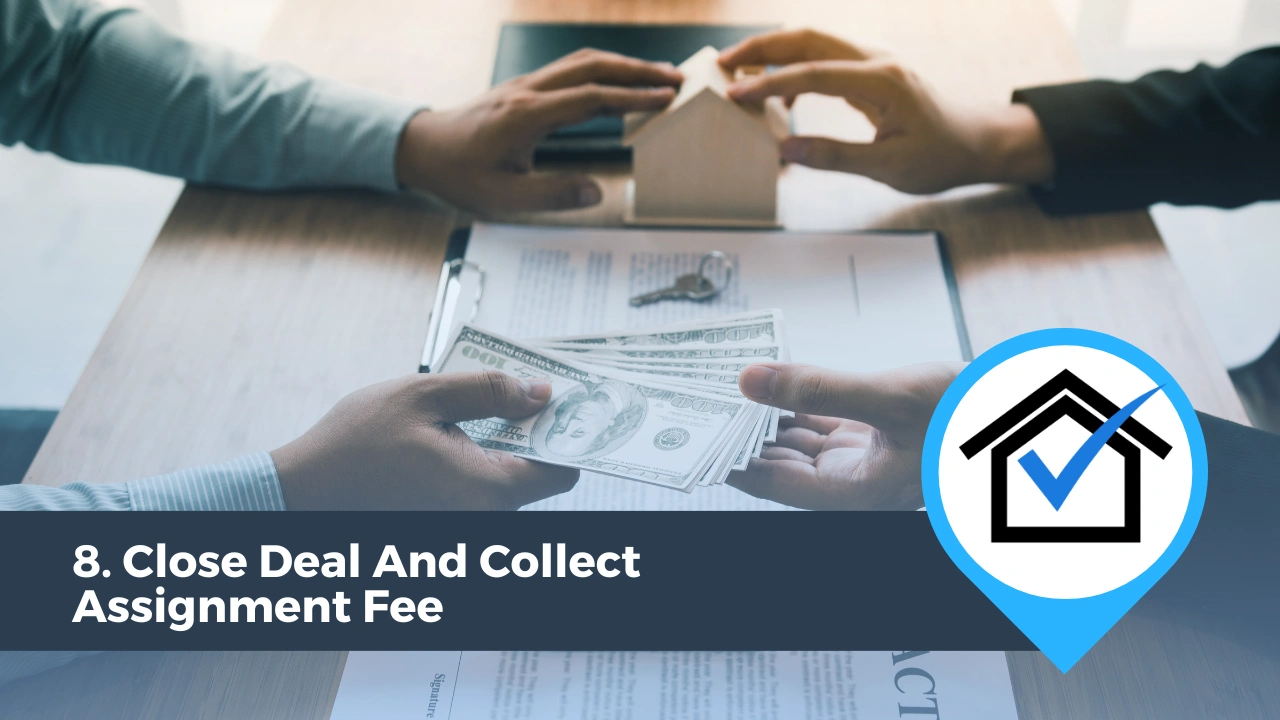
8. Close Deal And Collect Assignment Fee
By this point, you're almost at the finish line. You'll want to double-check the paperwork to make sure everything checks out. Consult an attorney to ensure you are using the correct contracts and doing everything within the parameters of the law if you're uncertain.
Once the contracts are signed, and the buyer has been assigned the interest in the property, you are free to collect your assignment fee and walk away from the deal. They will take care of all the closing costs because they're assuming the property's ownership. So, once both the buyer and seller sign on the dotted line and the sale closes, you can move on and look for your next deal.
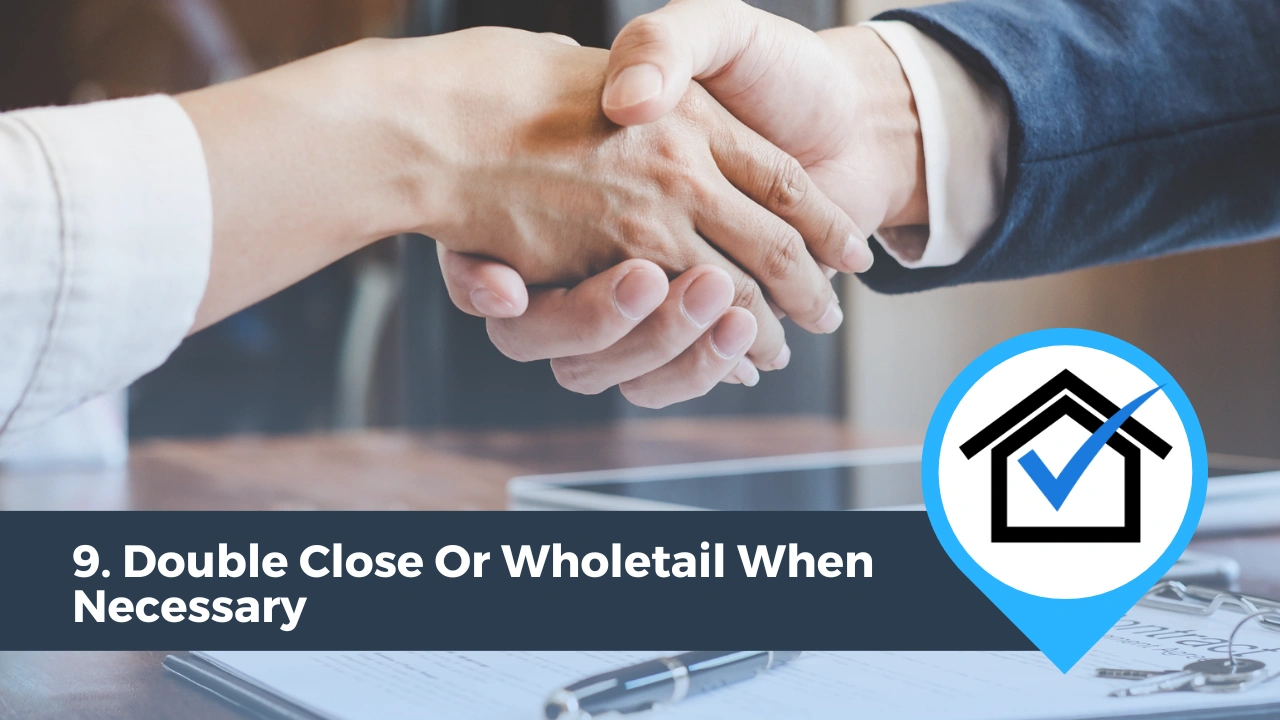
9. Double Close Or Wholetail When Necessary
It's also good to be aware that you may consider a few different closing strategies. A double closing is one common example that involves closing on the same property twice in one day. In most cases, wholesalers are better off assigning their interest, which means they never actually purchase the property.
But with a double close, you buy the property from the seller, then turn around and sell it to the buyer immediately afterward. Doing so may be more expensive because you may have to pay double the closing costs, but it may be required if the buyer is financing the deal and their lender does not accept assignment contracts.
Another strategy is wholetailing, which involves purchasing the property and doing cosmetic upgrades. Wholetailing is a step between wholesaling and flipping houses. It doesn't typically involve a full rehab, only light cleaning and small upgrades, but you must purchase the property and pay for some maintenance. As a result, it's slightly riskier but offers higher profit margins.
*For in-depth training on real estate investing, Real Estate Skills offers extensive courses to get you ready to make your first investment! Attend our FREE Webinar Training and gain insider knowledge, expert strategies, and essential skills to make the most of every real estate opportunity that comes your way!
Is Wholesaling Real Estate Legal In Vermont?
Yes, wholesaling is legal in Vermont, but certain behaviors are prohibited. Wholesaling is legal as long as you don't violate any of the laws outlined in the Vermont legal statutes. The law states that for the wholesale deal to go through, the buyer must commit to the sale by signing a purchase contract and providing an earnest money deposit.
So verbal affirmation and handshake deals will not suffice. It's also important to note that wholesalers in Vermont can only share their equitable interest in the contract; they are not permitted to sell the property or their interest in the property. So understand these key distinctions and limitations to avoid breaking the law as a wholesaler.
How Much Do Real Estate Wholesalers Make In Vermont?
The beauty of wholesaling is that there's no ceiling to the amount of money you can make. It all depends on how hard you work and how much time you have to commit. The average assignment fee is around $10,000. Even by closing one deal every two months, beginners can earn an additional $50,000 yearly.
The best real estate wholesalers can earn more than $600,000 annually by closing 5-10 deals per month. The earning potential is nearly unlimited once you master the craft.
Read Also: Wholesale Real Estate Salary | The (ULTIMATE) Guide
Do You Need A License To Wholesale Real Estate In Vermont?
No, you do not need a real estate license to wholesale in Vermont. A license is not required to buy or sell real estate, so as long as you stick to being a middleman, you don't need any official credentials. However, a license is required if you plan to represent another party in a transaction for a fee.
So if you plan on giving advice or helping market any properties owned by another party to earn a commission, you'll need to be licensed.
Read Also: Vermont Real Estate Classes: Wholesaling, Flipping & Licensing
Vermont Real Estate License Requirements
If you are considering becoming a real estate agent in Vermont, you'll want to be sure you meet the requirements. You must be at least 18 years old and a resident of Vermont. Although a college degree is not required, you must complete 40 hours of approved pre-licensing education and pass a final exam.
You must also pass a separate exam administered by the state of Vermont. Real estate agents are also required to find a brokerage willing to sponsor them and complete the Vermont real estate salesperson application.
Read Also: Can A Realtor Wholesale Property? The (ULTIMATE) Guide
Is Wholesaling In Vermont Easy?
It depends on how you look at it. Wholesaling is one of the most straightforward ways to earn sizable fees quickly (most wholesale deals close within 30 - 45 days). Closing deals regularly can allow you to earn an income comparable to a full-time job, yet often requires fewer hours. However, that doesn't mean it's a get-rich-quick scheme either. Wholesaling takes patience, hard work, and discipline.
Plus, when you're first learning the ropes, you'll likely have to go through trial and error until you find a system that works for you. One way to make the process easier is to find a coach, mentor or training program like the Pro Wholesaler VIP Program offered by Real Estate Skills.
The Pro Wholesaler VIP Program is designed for the modern entrepreneur to learn the basics and how to help new real estate wholesalers avoid the pitfalls typically found by beginners. It is 100% online and is used for local and virtual real estate wholesaling.
Final Thoughts On Wholesaling In Vermont
Wholesaling is an excellent strategy for those who want to get into real estate investing but don't have the experience or credit to attempt other riskier techniques. It's a great strategy for beginners who wish to learn more about the business and allows virtually anyone to get started earning impressive fees.
Vermont has a strong real estate market and plenty of resources and organizations for investors, making it a perfect state for wholesaling. But if you want to be successful, it's crucial to do the research and have a solid understanding of the laws, techniques and local real estate market before diving in.
Ready to Take the Next Step in Real Estate Investing? Join our FREE live webinar and discover the proven strategies to build lasting wealth through real estate.
Whether you're just getting started or ready to scale, we'll show you how to take action today. Don't miss this opportunity to learn the insider tips and tools that have helped thousands of investors succeed! Seats are limited—Reserve Your Spot Now!
*Disclosure: Real Estate Skills is not a law firm, and the information contained here does not constitute legal advice. You should consult with an attorney before making any legal conclusions. The information presented here is educational in nature. All investments involve risks, and the past performance of an investment, industry, sector, and/or market does not guarantee future returns or results. Investors are responsible for any investment decision they make. Such decisions should be based on an evaluation of their financial situation, investment objectives, risk tolerance, and liquidity needs.

